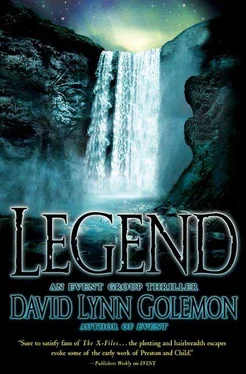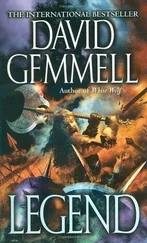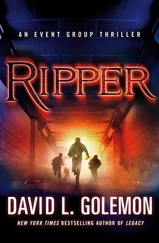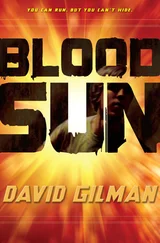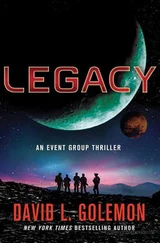As one of the seals was cracked open, the Chinese laborer had failed to see that some of the powder had adhered to the cork sealant. The elderly Chinaman blinked his eyes and felt the powder soak into the pores of his skin. He immediately convulsed once, then again more violently. He coughed, a deep fluidic sound that forced burst membranes to spew forth an avalanche of blood and mucous. His eyes bulged and the pupils rolled back to show the whites that were quickly filling with blood.
The admiral and Seito backed away in horror as the man started to come apart from the inside. Tarazawa watched in terrified fascination as the infected man fell to the hardened and rotted wood decking, coughed out another glob of blood, and then finally lay still in death.
"What have we uncovered?" the admiral asked aloud as he and Seito moved quickly to the makeshift ladder leading to the upper deck. They climbed as quickly as possible to safety.
Lieutenant Seito, his young face scrunched up in horror at what they had just witnessed on the old petrified vessel, hung his head. Then he looked up with hope in his young eyes. Seito was one of the Imperial Navy's brightest. He had been drafted into the service just last year. He, like many in his class, was also a realist and knew no matter what the fanatical right wingers in the government said, Japan had lost the war. He only hoped there were still people around in his homeland after the shooting stopped. He was one whom those fools called defeatist, one who wished for an immediate cessation of hostilities no matter what the price might be, even to the point of the emperor having to abdicate and admit his false divinity.
"Surely this horrible plague, this substance, shouldn't be potent after seven centuries? Well?" Tarazawa questioned the eldest of the Chinese who had only moments earlier escaped the fate of his countryman inside.
"As it is in a powder form, the Khan must have planned to disperse this substance on the winds if his invasion met with disaster."
Above them, on the makeshift scaffolds extending from the deck that they sat on, they heard the return of Colonel Yashita and his men. Then the thud of block and tackle as it struck the scaffolding and strongest parts of the ancient deck.
"He's come to take the cargo from the hold of the vessel," Seito said, removing his cap and wiping the sweat from his brow. "Are you going to allow this?"
Tarazawa stood and picked up the lantern. "Colonel Yashita's intention is the salvation of the war, and is dishonorable for the single fact he would only prolong this conflict for his own selfish reasons, and would possibly kill many hundreds of thousands of Americans, bringing on a retaliatory response that could possibly end the Japanese civilization. This must not be allowed to happen."
"What are you saying, sir?"
Tarazawa didn't answer. He just looked from the Chinese laborers to the lieutenant and then lowered the wick in the lantern until it dimmed and then died, casting them and the Japanese Empire into darkness.
OKINAWA, JAPAN PRESENT DAY
As the last of the rocks were moved away by Japanese contractors hired on the island, Professor Fallon called a halt. He asked the islanders and most of the Cal Riverside students to leave the cave for safety reasons. After hearing the story as told by the old soldier Seito the week before, the professor wasn't taking any chances. The documents he had uncovered in Beijing twenty years ago with the aid of the Chinese government, during one of their more friendly and nonenlightened periods, had told him that beyond that wall could be found not only a great archaeological find with the Chinese junk, but also one of the most dangerous substances known to man.
Of the six people left to remove the last of the lava rock and stone, Sarah was out in front. A trained geologist, she would watch for instability in the rock fall when the opening was cleared. She was joined by Dr. Kowalski, who bore with her a device they called a "sniffer." It would measure and analyze the air particles, and immediately alert her if any of the substance had become airborne after Tarazawa had sealed the excavation in '45. Both women were now dressed in airtight chemical suits. Carl Everett wondered if their animosity was coming through their small speaker systems as they removed the last stone.
"Stand clear, Ms. McIntire, if you please. I must be able to get a solid reading," Andrea Kowalski said.
Sarah was about to respond when she heard Carl clear his throat from about ten feet away. She instead backed away as ordered.
Andrea handled the microphone-shaped probe expertly as she eased it cautiously through the door-size opening, careful not to touch the stone itself. Once it was inside the opening, she placed a thin panel of steel over the hole and then thumbed a switch on the sniffer's small control panel. Inside the darkness of the cave, the microphone-shaped device came apart with a small pop. The heavy springs inside engaged and sent two hundred small darts in all directions. Each dart was tungsten tipped and the small shaft was made of lypcochlorinide, which upon impact sent a burst of moisture into the air, activating any minute amounts of any substance that may be embedded in the lava rock. The tungsten heads were miniature radio units that would relay any findings to the device's control panel. Of the two hundred darts, some found rock, others sand, and still others tumbled into the blackness. Andrea slowly brought up the particle gauge and read the virtual readout. The device was so sensitive it immediately broke down all the airborne elements in the old excavation.
The others watching Andrea's progress could see the woman in her yellow chemical suit slowly relax her shoulders as the small darts sent back their vital information on the air quality in the cave. But none of them realized just how tense she had become.
Carl finally took a breath, not even knowing he had been holding it. He relaxed when he saw her remove the small steel plate from the hole.
Andrea removed a small round object from her belt, leaned into the opening, and tossed the small device as far as she could. The round object was a one-time-use portable analysis pod. Once thrown, it would separate into five different sections and its components would read the interior air of the confined space. It was so accurate that it picked up the traces of cordite and TNT that had been used in 1945, over sixty years before.
Andrea removed her hood. "All clear; only one strange reading I can't figure out," she said. "But it's nontoxic."
"What is it?" Professor Fallon asked, with concern.
"Trace amounts of blood."
The others started to remove their own protective equipment.
"Don't do that, please; just because there is nothing in the air doesn't mean we won't disturb trace amounts when we enter. The petrie darts only cover about ten percent of the cave; that leaves ninety percent capable of carrying something that could kill you all," Andrea said blandly as she placed her own hood back in place.
As she turned and entered the cave, Professor Fallon and Carl and two other members of the dig team hefted the portable lighting they would use in the initial phase of the recovery. Sarah was the first to follow the CDC specialist into the opening. She switched on her flashlight once she was inside. At first, all she caught in the light was floating dust and the back of Andrea, who was waving another metal probe that was connected to her readout, this time making sure their footsteps weren't bringing death with every movement they made. Then Sarah's light caught the geometric shape of wooden scaffolding standing out through the dust swirls. Out of the darkness rose a black ship. Still legible on its side was what looked like a faded dragon carved into the dark wood. It ran the entire length of the ship and its tail wrapped around the stern. As she played her light around it, she could see that the bottom half of the vessel had deteriorated badly. The rotted planks that made up its hull were starting to collapse, causing the top deck to sag into the interior of the vessel.
Читать дальше
